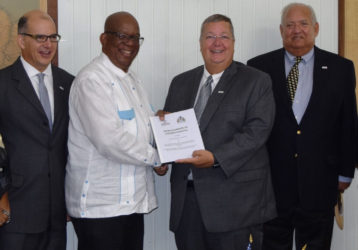A Memorandum of Understanding (MoU) was signed yesterday between Guyana and the US for the Youth Empowerment Service (YES) programme in Corriverton, East La Penitence, Sophia, Lodge and East Ruimveldt which will focus on at-risk young people.
The signing was done by Minister of Finance, Winston Jordan and Mission Director of the United States Agency for International Development (USAID), Christopher Cushing, to assist areas which were found to have high incidences of incarceration, crime and violence, teenage pregnancy, youth unemployment, school dropouts and drug use.
The four-year YES programme was designed to reduce youth involvement in crime in 10 countries in the Caribbean at a cost of US$64M. Guyana has been chosen to be one of the three focus-based countries together with St. Lucia and St. Kitts and Nevis.
At the signing ceremony Cushing said: “Working together with regional bodies, the government of Guyana and community stakeholders, the YES Project will strengthen protective factors that build youth resilience to crime and violence, while reducing those that influence them in becoming perpetrators or victims of crime and violence.”

This, he added, “in turn will lead to more resilient youth, families and communities. The project uses a community-centred and public health model for crime and violence prevention to identify, analyze, and support project interventions.”
According to him, it will entail data collection “to understand where and why crime and violence is happening and will also support juvenile justice reform.”
The programme, he said, will also foster broader and deeper community engagement, positive youth development and increase local and national services to respond to a variety of social development needs.
Cushing said too that support services will include individual and family counselling, behaviour therapy, expanded education and job placement.
He pointed out that the “YES Project is driven by an evidence-based approach. As evidence is used to develop the appropriate strategies for Guyana, USAID will invest in evaluating the effectiveness of these strategies.”
It will also “ensure that successful practices are shared and replicated and that evidence is generated to support additional and sustained investment by our government and other partners.”
The project’s success will depend on partnerships created with diverse stakeholders working towards common goals.
Cushing noted that this includes “engaging youth as positive change makers, working with ministries and other government agencies, business leaders, law enforcement, the justice sector, training institutions, the media, community-based organizations and others.”
Speaking about one of its recent projects; the US$7.7M Skills for Knowledge and Youth Employment (SKYE), Cushing said it was a “resounding success.”
He pointed out that many Guyanese youth benefitted from new opportunities such as furthering their education with others acquiring skills that enabled them to be gainfully employed while some who ventured into small-business ownership are poised for long-term success.
Jordan said the USAID/Government intervention would build on the achievements made in the SKYE precursor programme, which had assisted in creating alternative opportunities for at-risk youth.
He noted that more than 35 percent of Guyana’s population falls in the 15 to 35 age cohort and believes that they must be able to participate in their own development trajectory.
He said that in order to ensure a structured approach, government finalized the National Youth Policy, which was subsequently tabled in parliament.
He thanked the government and the people of the USA for their continued support for Guyana’s development efforts over the years.
He expects that the programme would help to produce a safer and more cohesive society.




